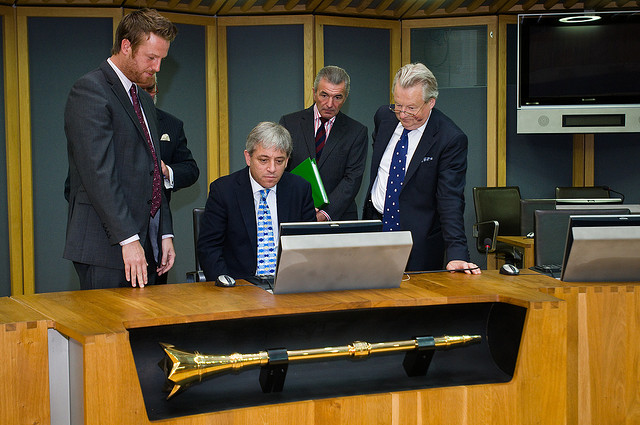Social media may have the potential to truly enhance our democracy, but there is still distance to go
What role can social media play in our democracy, and will its potential to affect genuine change be effectively harnessed? In a recent event in the Palace of Westminster, Carl Miller and Alessia Tranchese of Demos scoped where social media is and can have an effect, concluding that we still have a long way to go before we reach a genuinely digital democracy, despite the prominent role played by Twitter, Facebook, and co during the Arab Spring, the Everyday Sexism campaign, and Italy’s Five Star Movement.
Last month an event in Parliament examined the impact of social media on democracy. Is it making democracy stronger or weaker? Are the vast oceans of social media full of democratic potential, or meaningless, impotent hot air? Is social media allowing new people to do politics – influence politicians, get involved in campaigns, even start their own political parties? Or is it just an obsession of the Westminster bubble, another reminder of the gap between the carpeted corridors of power and the rest of the UK?
Predictably, we currently have more questions than answers. Each of the speakers at the event (including me) wrestled with the idea of democracy and the digital sphere – an issue only as important and timely as they are complex and difficult.
Social media is a hopelessly large, varied, diverse collection of places. What is clear is that it is emerging as a double-edged sword to democracy; empowering and also debilitating – engaging but also creating new barriers and problems. Here are three apparent success stories that show us the democratic gains and losses of social media.
Everyday Sexism
A project that managed to raise the profile of the daily, even mundane discrimination and abuse faced by women. Their powerful message is that gender equality is far from complete – even in Western countries. Their campaign wouldn’t have been possible without social media. Many women have been able to tell their stories via Twitter or on the project blog and together they pushed grassroots, normal voices in the spotlight.
Evertday sexism shows us that social media is a new way to expose discrimination and misogyny. But, vitally – social media is a new forum for it. Laura Bates, the founder has often declared that, together with a huge number of stories of oppression and discrimination of women in the offline world, she also receives a huge amount of hate-filled messages targeting her or women in general. The growth of feminist movements online seems to have spurred an equally powerful spree of online misogyny. This phenomenon affects women on a daily basis. A study by the University of Maryland showed that feminine accounts in chatlines received an average of 100 sexually threatening messages a day. Masculine usernames received 3.7.
The unfortunate and more general fact is that the net is far from being a neutral platform where all people are equal and where we all – including women – could express our opinions. Anonymity online doesn’t help, neither do various prevalent Internet sub-cultures. Even the IT and technology industries are heavily male dominated. Whatever the reason, we’re failing to build women-friendly environments online, and to really see the online landscape challenge the traditional social divisions of the offline world.
Beppe Grillo
started a political Party – the Five Star Movement (M5S) – to try to do politics differently in Italy. When Beppe Grillo and Gianroberto Casaleggio (the man whose company finances Grillo’s blog) created the the M5S, they knew that people in Italy had reached a point of no return. Frustration, hopelessness and mistrust in the “political caste” were at historical highs and people needed a source of hope. The home of the M5S is ranked only 49th in the world for freedom of press; youth employment is at an all-time low, and scandals involving political corruption and inefficiency are in the news every other day.
He tried to show how social media can be used for direct consultation and participation of citizens, to bring new voices into the debate. Here, Grillo’s idea appealed to many and turned the comedian into a popular politician. Grillo’s political movement gave them this hope.
But is Grillo going about politics in a new, more participatory and open way? Probably not. He hasn’t managed to scatter power in the way his original, radical rhetoric implied. For instance, he claimed that his blog was open to anyone, although he is the only one who can decide who can talk on behalf of M5S, as he is the owner of the symbol and name of the movement. And he did not hesitate to use his power to expulse a group of senators who disagreed with him early this year. On another occasion, he posted a video on his blog with the title “What would you do alone in a car with Boldrini?” (Laura Boldrini is the Speaker of the Italian Chamber of Deputies). The question received many comments, including rape threats that were tolerated on the blog for a few days.
Unfortunately, this looks all too depressingly familiar. A radical, popular politician sweeps into power promising radical change. Slowly, the promises begin to fade. Nothing new here.
The Arab Spring
Internet activism on social media has also played an important role in the opposition against oppressing regimes throughout the Arab world. The ‘We Are All Khaled Said’ movement in Egypt, for example, managed to mobilise society on the streets to campaign and protest against police brutality.
But, again, this case raises another question: how can social media contribute to democracy when a big chunk of the population around the world cannot access them? The role played by social media in the insurgence against the regime in Egypt was certainly significant and unprecedented, but in a country where Internet coverage is very low, their role is doomed to be a limited, and uneven one. The truth is that many more vulnerable groups (e.g. old people, people with disabilities, unemployed people) today are still excluded from digital communication. What will be of those voices that cannot be heard (or reached) through social media because they are denied access to them? Moreover, the situation gets worse in countries where state censorship is the rule. Even in the case of Egypt, for instance, the government decided to shut down digital communication when it realised its potential.
Each of these examples is, of course, a small window into different parts of the problem. They suggest that social media is – in many different ways – not paying the democratic dividends that it ought. The point is that the Internet and social media are mere tools, they are not inherently positive or negative; it is who owns them and the way they are created, used and managed that turns them into tools of power and/or equality. The fact that they offer people a platform to share their views does not necessarily create a more democratic system that will listen to them. More freedom to give voice to one’s political opinion (or to share them on a public platform) does not automatically translate into participating, being listened to or influencing decision-making.
Underlying each of these cases are two extra problems that are broad and cross-cutting.
- First, dialogue. The ability to voice one’s opinion does not imply the ability to dialogue, i.e. the very nature of democracy. Many people often use social media to express their views to individuals or groups who agree with them, thus leading to a reinforcement of what they already think rather than to real discussion. On the other extreme, people use social media to abuse those they disagree with by taking advantage of the anonymity offered by the net.
- Second, ownership. Social media platforms are, fundamentally, advertising companies. Facebook, Twitter and the rest subsist on their ability to attract your attention and sell that attention to advertisers. There is nothing wrong with this, of course; but we often assume and expect that they will behave like neutral guardians of these new public spaces. They will not, and we have no right to make that expectation. Activism on social media are public marches happening on private land.
The examples above show that social media may have the potential to enhance a true digital democracy, but that we have a long way to go. But then, the path towards democracy has always been a rocky one, and is nonetheless one well worth walking.
—
This post represents the views of the author and not those of Democratic Audit UK or the LSE. Please read our comments policy before posting. ![]()
—
Carl Miller is co-founder and Research Director of the Centre for the Analysis of Social Media (CASM) at Demos.
 Alessia Tranchese is a Research Intern at Demos. She received her Ph.D. from the University of Naples Federico II (Italy). Her research project was about the representation of rape in the British press.
Alessia Tranchese is a Research Intern at Demos. She received her Ph.D. from the University of Naples Federico II (Italy). Her research project was about the representation of rape in the British press.







 Democratic Audit's core funding is provided by the Joseph Rowntree Charitable Trust. Additional funding is provided by the London School of Economics.
Democratic Audit's core funding is provided by the Joseph Rowntree Charitable Trust. Additional funding is provided by the London School of Economics.
Is social media really making us more democratic? Piece with @alessiatranches in @democraticaudit – https://t.co/o4cFg7WSwK
RT @Mfpey: #Socialmedia may have the potential to truly enhance our #democracy https://t.co/ITUjlpKCv6 vía @democraticaudit
Is social media REALLY making society more democratic? My piece with Alessia Tranchese @democraticaudit – https://t.co/xmKzizREyh
Is social media really making us more democratic? Not yet. Great article from @carljackmiller & @alessiatranches https://t.co/XhQHZaV2o9
RT @se_kip: .@carljackmiller & Alessia Tranchese of @Demos talk social media and democracy on @democraticaudit https://t.co/YJQzBdiQrM
Social media have the potential to truly enhance our democracy, but there is still a way to go https://t.co/JgZ5CrDFcY https://t.co/4creFkJLOa
Social media may have the potential to truly enhance our democracy, but there is still distance to go @Demos https://t.co/kOcSAqFDLO
Social media and democracy. https://t.co/dGiLyFLkLr
There is still distance to go for #socialmedia to enhance #democracy https://t.co/wPoqA24W5p #pplnewmedia
“Activism on #socialmedia are public marches happening on private land” – digital democracy acc to @democraticaudit: https://t.co/6OEI2aIIC3
Social media may have the potential to truly enhance our democracy…still distance to go https://t.co/837KwIo3ni @ulfbjereld @partiforskning
Social media may have the potential to truly enhance our democracy, but there is still distance to go https://t.co/4Ot3xOHQqg
#Socialmedia may have the potential to truly enhance our #democracy https://t.co/QDd6zsTlNy vía democraticaudit
A truly digital democracy is still a long way off https://t.co/KMRebu5cCk
Social media may have the potential to truly enhance our democracy, but there is still distance to go https://t.co/wD0UGMtlpc